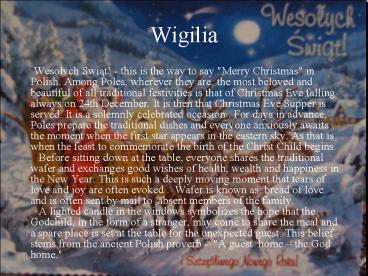Wigilia - PowerPoint PPT Presentation
1 / 3
Title:
Wigilia
Description:
... Christmas Carols while children wait impatiently around the Christmas tree for gifts. ... There is a popular belief in Poland that while the congregation ... – PowerPoint PPT presentation
Number of Views:117
Avg rating:3.0/5.0
Title: Wigilia
1
Wigilia
- Wesolych Swiat - this is the way to say "Merry
Christmas" in Polish. Among Poles, wherever they
are, the most beloved and beautiful of all
traditional festivities is that of Christmas Eve
falling always on 24th December. It is then that
Christmas Eve Supper is served. It is a solemnly
celebrated occasion . For days in advance, Poles
prepare the traditional dishes and everyone
anxiously awaits the moment when the first star
appears in the eastern sky. As that is when the
feast to commemorate the birth of the Christ
Child begins. Before sitting down at the
table, everyone shares the traditional wafer and
exchanges good wishes of health, wealth and
happiness in the New Year. This is such a deeply
moving moment that tears of love and joy are
often evoked . Wafer is known as bread of love
and is often sent by mail to absent members of
the family. A lighted candle in the windows
symbolizes the hope that the Godchild, in the
form of a stranger, may come to share the meal
and a spare place is set at the table for the
unexpected guest. This belief stems from the
ancient Polish proverb - "A guest home the
God home."
2
- Although the Church laws have been revised and
permit meat to be eaten on this day, the meal
traditionally remains meatless and include
mshroom soup, boiled potatoes, pickled herring ,
fried fish, pierogi, beans and sauerkraut , a
dried fruit compote, various pastries, nuts and
candies. - After the meal, members of the family sing
Polish Christmas Carols while children wait
impatiently around the Christmas tree for
gifts. Another tradition on this day is the
Midnight Mass. It starts the true C hristmas Day-
25th December. In spite of the late hour and
tiredness, churches in Poland are full of
believers old, young and even babies. Everyone
wants to feel this unrepeatable atmosphere. - There is a popular belief in Poland that while
the congregation is praying, peace descends on
the snow-clad, sleeping earth and that during
that holy night domestic animals can speak like
humans - but only those with innocent heart may
hear them.
3
SZOPKI
A long time Polish tradition during the
Christmas season is called Szopki. They are
beautifully decorated and very elaborate forms of
the Nativity scene. This tradition started back
in the 13th century in Krakow, Poland, and
remains an annual tradition and exhibition. Major
prizes are awarded for the most elaborately
decorated and designed piece of work. They
sometimes reach two metres in height and
their construction is based on elements of
Krakow's historic architecture. Here is
a miniature version of Szopka.
























